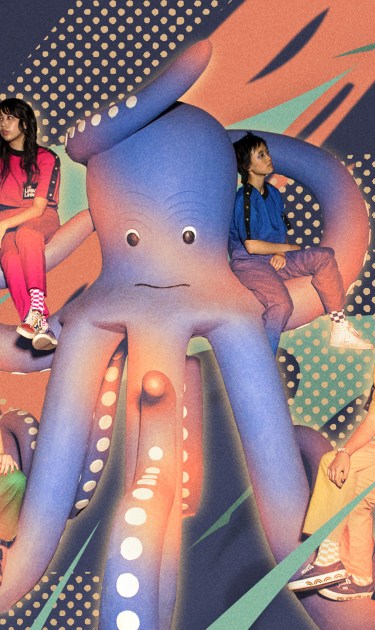For most teens, summer marks a break from school filled with relaxation, friends, and fun. For half-Asian, half-Latine punk phenoms The Linda Lindas, it does too. But their friends happen to include legacy bands like Green Day, Smashing Pumpkins, and Rancid, and their fun incorporates touring across the nation, playing some of the most famed stadium arenas around.
In 2021, their meteoric rise surged as they took the internet by storm from within the walls of a Los Angeles Public Library. Inspired by the youngest member’s confrontation with a schoolmate, their performance of “Racist, Sexist Boy,” which addressed relatable harassment experienced by young women of color, became immortalized in viral memory. The song’s potent message and infectiously raw energy made it clear from the first snarling growls and electric riffs that The Linda Lindas had something to say, and the world was going to listen.
What began as a cover band for Dum Dum Girls’ Kristin Kontrol at Girlschool Rock Camp LA in 2018 quickly evolved into a powerhouse of creativity marked by four gifted artists with an inimitable force for making noise. Bela Salazar, Mila and Lucia de la Garza, and Eloise Wong have since developed into one of alt-rock’s most sought-after acts — all before their high school graduations. “We’re really grateful and really excited about doing new things and how much better we’ve gotten over the years,” opens up Lucia. “We never thought that we’d be here touring. But we’ve decided that we just want to really embrace it.”
One of their earliest supporters was Chicana punk pioneer Alice Bag, whom the band collectively cites as a mentor and early musical influence. Other big referents include Latine rockers The Zeros and Los Prisioneros — best known for “Tren al Sur,” a song that marked one of the earliest covers performed by the band. Taking a page from their predecessors’ books, they’ve learned to embrace authenticity over all else. “When we write, we’re writing about our lives — things that are part of our story,” Salazar explains.

While their formative years’ efforts focused on becoming seasoned musicians and introducing their signature sound of punk meets power pop, their more recent work has become reenergized by more experimental and expressive outlets. Their 2022 debut album, Growing Up, debuted the band’s first Spanish-language track, “Cuantas Veces,” a bossa nova-tinged song that speaks to the hardships of accepting difference while searching for a place to belong. It’s not lost on the band that their diversified heritage can complicate their sense of belonging.
Consisting of a mixture of Mexican, Salvadoran, and Chinese descent, their multi-ethnic identities and being raised in a multicultural, artistic urban sprawl like Los Angeles are a testament to the creative influences that surround them – as much from Mexican regional on local airwaves to the DIY backyard punk scene. Glass half full types, they seek to celebrate the dynamic, hybrid sounds that uniquely raised them rather than view it as a hindrance. “I feel like we’re really portrayed as this Asian band – which is great! I think that’s really cool,” shares Mexican-Salvadoran Salazar. “But a big portion of us are also Latinx, and I think that it’s also important to talk about our story too.”
As they prepare for their sophomore album, No Obligation, out Oct. 11, they’re continuing to vet new frontiers, including their newest Spanish-language track, “Yo Me Estreso.” Exploring unconventional inspiration, the band traded heavier rock influences for the sounds of música mexicana. “I listen to a lot of things my family listens to, a lot of Mexican Regional music,” Salazar shares. “I wanted to find a way to incorporate that into what we do as a band.”

We’re really portrayed as this Asian band – which is great!… But a big portion of us are also Latinx, and I think that it’s also important to talk about our story too.
Enter corridos tumbados, banda, and Duranguense as referential baselines for their latest alternative venture. “I would play stuff for [the band] to understand the vibe I was going for,” she adds. As for who made Salazar’s on-repeat studio playlist, she recounts: “When I wrote that song, I was listening to a lot of Junior H and Peso Pluma. Lucia and I actually went to see Peso Pluma together [in NYC]!” What exactly is the outcome of the intersection where regional meets rock? An incredibly fun and folksier side of punk that incorporates banda’s tempoed counts and música mexicana’s sounds of accordions, trumpets, and tuba.
Their recent shift towards Spanish-language work may seem like a left-field pivot to the general public, especially when considering the popular domination of Latine music on the global musical front. But the band unanimously assures it was an organic matter of when it would happen more than if. “Being Latinx has always been something that we’re really proud of,” discloses Salazar before Lucia joins in, adding, “I think we were always going to be excited about doing something new or bringing different stuff to the table.” A shift back to Salazar completes the thought with a candid downside to the experience: “I think the scariest thing is being someone whose first language is not Spanish, and being scared that people with Spanish as their first language are going to be like, ‘The grammar’s wrong, it’s all wrong!’”
With the recent viral interview moment with Mexican-Puerto Rican Jenna Ortega, the “Latina-enough” discourse continues to be heavy on the community’s mind. What constitutes being enough and who gets to decide those factors remains an oscillating and subjective slide. “People say it all the time, that you shouldn’t read the comments,” Salazar continues, “but every once in a while I do, and I feel like there’s always that question where people don’t think I’m Latina or Latina enough – which drives me nuts. Everybody looks different; you can’t just judge a book by its cover.”

Despite the challenges of being a multi-ethnic band, The Linda Lindas nonetheless remain committed to the band’s values, attributing their learned value of family and community to their Latine heritage. “We’re lucky to have supportive people around us,” Mila emphasizes. “We’ve always made sure not to surround ourselves with people that are going to put us down for anything stupid like that.” She adds that their families are usually on tour with them, but in instances where that’s not the case, they find it nice — and a running inside joke — that they can find extensions of it on the road. “When we were in Europe, we called it the Cousin Tour. One of Bela’s cousins was in every country in Europe,” Wong lightheartedly shares. “It’s so funny!” the de la Garza sisters join through giggles. “I have a lot of cousins!” Salazar responds.
Heading full force into their latest era, grown up and more confident than ever, The Linda Lindas marks a needed cultural shift in the world of rock on a global front. With unwavering attitudes and unapologetic art, the band is pioneering space toward a more inclusive and vibrant future music scene by intentionally embracing all sides of their cross-cultural heritage — and has zero plans to stop anytime soon.
The Linda Lindas have No Obligation to please anyone other than themselves, and it will never get more punk than that.

